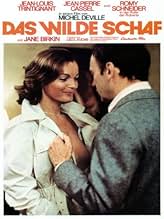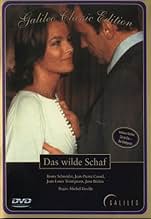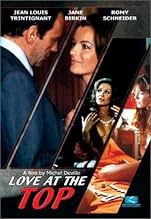VALUTAZIONE IMDb
6,7/10
2214
LA TUA VALUTAZIONE
Scopri i diversi modi di amare ai tempi della rivoluzione sessuale.Scopri i diversi modi di amare ai tempi della rivoluzione sessuale.Scopri i diversi modi di amare ai tempi della rivoluzione sessuale.
- Regia
- Sceneggiatura
- Star
Recensioni in evidenza
Michel Deville quietly left us and this world a few weeks ago, and his disappearance would have gone unnoticed, for me at least, if some television stations had not marked the sad event by programming some of his films. A contemporary and colleague of the formidable New Wave generation, Deville was an interesting and quite prolific director. Somewhat more conservatory in style than his more famous colleagues, he was bolder in his choice of themes, making (and sometimes writing) films about unusual relationships between men and women, set in social environments where corruption and ambiguity are rule. He was also considered an excellent 'director of actors', so that the names of most of the famous French actresses and actors of the eras in which he created appear on the credits of his films. 'Le Mouton enragé' (the English distribution title is 'Love at the Top'), released in 1974, is one such example. I chose to see the film for its formidable cast, and I discovered an interesting movie, a story of social ascension through unusual means that could not have been brought to the screen in this way today, and which, if ever a 'remake' is made, will look completely different.
Nicolas Mallet is a bank clerk dressed in gray suits and wearing bland ties. Shy and uninteresting, he allows himself to be manipulated by his friend Claude Fabre, a failed writer who lives off private French grammar lessons given in bistros. A kind of puppet manipulated into deeds and adventures far different from his psychological profile. At Claude's prompting, Nicolas enters into relationships with very different women, then with politicians, leaves his stable job to become an intermediary in politics (today we would call him a lobbyist) and in dubious dealings at an increasingly higher levels. The fun thing is that the scheme succeeds beyond all expectations. The marionette proves to be a talented lover, the women he conquers are gorgeous and the politicians he supports are elected to Parliament. For the manipulator Claude the only reward seems to be the detailed accounts that Nicolas gives about his adventures. Any pyramid business, however, risks eventually collapsing.
In the story taken from Roger Blondel's novel, the separation between the roles of men and women in relationships is one that would not be accepted in today's movies. Nicolas, behind his shyness, is almost a predator seducer and the women who meet him seem to easily become his victims. But is that really how things are? The three women that Nicolas (played by Jean-Louis Trintignant) meets are very different from each other. Marie-Paule (Jane Birkin at the peak of her youth and beauty) may be a prostitute, but she is sincerely in love. Roberte (Romy Schneider in one of her most sensual roles) is looking for an escape from a boring marriage and knows her interests well, even if they fall outside the social norms. Finally, Flora (Florinda Bolkan) manages her relationships in a calculated way and does not lend herself to the role of victim at all. Behind all these social intrigues played with the tools of love is Claude, played by Jean-Pierre Cassel, who today we almost automatically call 'the father of ...', but who was himself a formidable actor. Seeing him in this film we understand where the son inherited his talent but also the look of the man who knows much more than he says. 'Le Mouton enragé' is a film that must be seen without prejudice and especially not through the lens of the cinematic moralism of 2023. It is not Michel Deville's best film, and precisely because of this it is proof that he was a director whose name must neither be forgotten nor ignored.
Nicolas Mallet is a bank clerk dressed in gray suits and wearing bland ties. Shy and uninteresting, he allows himself to be manipulated by his friend Claude Fabre, a failed writer who lives off private French grammar lessons given in bistros. A kind of puppet manipulated into deeds and adventures far different from his psychological profile. At Claude's prompting, Nicolas enters into relationships with very different women, then with politicians, leaves his stable job to become an intermediary in politics (today we would call him a lobbyist) and in dubious dealings at an increasingly higher levels. The fun thing is that the scheme succeeds beyond all expectations. The marionette proves to be a talented lover, the women he conquers are gorgeous and the politicians he supports are elected to Parliament. For the manipulator Claude the only reward seems to be the detailed accounts that Nicolas gives about his adventures. Any pyramid business, however, risks eventually collapsing.
In the story taken from Roger Blondel's novel, the separation between the roles of men and women in relationships is one that would not be accepted in today's movies. Nicolas, behind his shyness, is almost a predator seducer and the women who meet him seem to easily become his victims. But is that really how things are? The three women that Nicolas (played by Jean-Louis Trintignant) meets are very different from each other. Marie-Paule (Jane Birkin at the peak of her youth and beauty) may be a prostitute, but she is sincerely in love. Roberte (Romy Schneider in one of her most sensual roles) is looking for an escape from a boring marriage and knows her interests well, even if they fall outside the social norms. Finally, Flora (Florinda Bolkan) manages her relationships in a calculated way and does not lend herself to the role of victim at all. Behind all these social intrigues played with the tools of love is Claude, played by Jean-Pierre Cassel, who today we almost automatically call 'the father of ...', but who was himself a formidable actor. Seeing him in this film we understand where the son inherited his talent but also the look of the man who knows much more than he says. 'Le Mouton enragé' is a film that must be seen without prejudice and especially not through the lens of the cinematic moralism of 2023. It is not Michel Deville's best film, and precisely because of this it is proof that he was a director whose name must neither be forgotten nor ignored.
As the title of Michel Deville's film translates as the singularly uninviting 'The Rabid Sheep', there have naturally been a few alternatives, the most inappropriate of which must surely be 'Love at the Top'. Whoever thought that one up might perhaps have had in mind the earlier 'Room at the Top' and its sequel but Laurence Harvey's social climber Joe Lampton is a positive milquetoast compared to the Nicholas Mallet of Jean-Louis Trintignant. Monsieur Trintignant utilises his innate shyness and natural charm to great effect here so as to make his character less loathsome.
This film is the first of Deville's loosely connected trilogy that was to continue with the dark and disturbing 'Eaux Profondes' and culminate in his most accomplished, critically acclaimed and commercially successful 'Péril en la Demeure'. Of the three it is the most scathing and cynical and for this viewer at any rate, the weakest.
Trintignant's character is a latter day Bel Ami and the women he beds show precious little resistance, notably the enchanting nymphet of Jane Birkin who becomes remarkably docile after being clipped round the chops by our hero, gorgeous Romy Schneider's bored wife who pays the ultimate price for her infidelity, cougar Florinda Bolkan who paddles with both feet and septuagenerian Mary Marquet!
By far the most fascinating character and one that supplies the film's darkest element is the crippled writer Claude of Jean-Pierre Cassel, a near devilish personality who guides Nicholas on his way to sexual and financial success as well as living a life by proxy as he obviously covets his protegé's conquests. An astute critic has observed that Cassel and Trintignant could so easily have swapped roles.
Deville's preferred editor Raymonde Guyot guarantees a brisk pace whilst the excellent use of the music of Saint-Saens, notably his Third Symphony, reminds us that he is credited with writing the first film score for 'L'Assassinat du Duke de Guise' in 1908.
Is there a moral to the tale? 'Be careful what you wish for....' would seem the most apt.
This film is the first of Deville's loosely connected trilogy that was to continue with the dark and disturbing 'Eaux Profondes' and culminate in his most accomplished, critically acclaimed and commercially successful 'Péril en la Demeure'. Of the three it is the most scathing and cynical and for this viewer at any rate, the weakest.
Trintignant's character is a latter day Bel Ami and the women he beds show precious little resistance, notably the enchanting nymphet of Jane Birkin who becomes remarkably docile after being clipped round the chops by our hero, gorgeous Romy Schneider's bored wife who pays the ultimate price for her infidelity, cougar Florinda Bolkan who paddles with both feet and septuagenerian Mary Marquet!
By far the most fascinating character and one that supplies the film's darkest element is the crippled writer Claude of Jean-Pierre Cassel, a near devilish personality who guides Nicholas on his way to sexual and financial success as well as living a life by proxy as he obviously covets his protegé's conquests. An astute critic has observed that Cassel and Trintignant could so easily have swapped roles.
Deville's preferred editor Raymonde Guyot guarantees a brisk pace whilst the excellent use of the music of Saint-Saens, notably his Third Symphony, reminds us that he is credited with writing the first film score for 'L'Assassinat du Duke de Guise' in 1908.
Is there a moral to the tale? 'Be careful what you wish for....' would seem the most apt.
A so French satirical drama, or comedy drama, and played by the perfect cast of actors. Jean-Louis Trintignant and Romy Schneider are here not as good as in LE TRAIN, made the very same year, but this movie is a perfect testimony of this seventies period. Jean-Louis Trintignant is delightful of cynicism, selfishness, as a cool ruthless man. This film, I repeat, is a satyre of social rise during this period. Keep in mind that the seventies was a period that we never knew after. Greed was smooth, ambition was fun, and we could speak about that, show this without any restriction, with a bit of humor. Foreign audiences will probably understand nothing to it.
This is a comedy of morals, so occasionally a gentle touch of bitterness occurs, but a lightness soften all sarcasm and irony flows till all of a sudden one moment will halt your heart and changes everything.
This film, marvelously written and directed, is a gem that shines perfectly, with beautiful acting by all. Jean-Louis Trintignant is exquisite as usual, and Romy Schneider is a pearl, perfect and glowing, that is not to be missed. A truly wonderful film !!
This film, marvelously written and directed, is a gem that shines perfectly, with beautiful acting by all. Jean-Louis Trintignant is exquisite as usual, and Romy Schneider is a pearl, perfect and glowing, that is not to be missed. A truly wonderful film !!
Michel Deville was of the same generation as Truffaut, Chabrol and Godard, but resembles them not at all. He seems to belong to an older generation, like Carne and Renoir, but much more eroticized. The story is that of mentor and student (sort of Svengali and Trilby, but with two men). The homosexual undercurrent of the story should not be too hard to see for most viewers. Trintignant is the shy 'sheep' of the title, his overbearing mentor, who has emotional problems owing to his club foot, is Cassel, one of his most impressive performances.
I don't know who is really the female lead--is it Birkin or Schneider? They both have very important roles. Florinda Bolkan, so great in Investigation of a Citizen..., has another memorable role here. Mary Marquet, almost 80 at the time, has a superb cameo as the very rich woman Trintignant has to romance.
I don't know who is really the female lead--is it Birkin or Schneider? They both have very important roles. Florinda Bolkan, so great in Investigation of a Citizen..., has another memorable role here. Mary Marquet, almost 80 at the time, has a superb cameo as the very rich woman Trintignant has to romance.
Lo sapevi?
- QuizJane Birkin said she asked Jean-Louis Trintignant to hit her for real in a scene. "My first scene was rather difficult: I was naked in front of Trintignant in the hotel room. Moreover, in the script, it was written that he was kissing my breasts. I thought: My God, he has fallen badly! I was ashamed. Only one thing helped me: he had to slap me and make me fall on the floor. Now, when you get a slap on the mouth, your mouth becomes like cotton when you say the next lines. I had to say, 'You have a little bike in your head'. My mouth hurt and I said it in a cottony way. Unfortunately, we had to double the scene because of the camera noise, and I couldn't do it as well. I would have had to get a grip on myself! Today, I wouldn't hesitate to do it. Trintignant was nice, he didn't want to hurt me. I wanted him to hurt me, I begged him to hit me," Birkin recalled.
- ConnessioniReferenced in L'ultimo treno della notte (1975)
I più visti
Accedi per valutare e creare un elenco di titoli salvati per ottenere consigli personalizzati
- How long is Love at the Top?Powered by Alexa
Dettagli
- Data di uscita
- Paesi di origine
- Lingua
- Celebre anche come
- Love at the Top
- Luoghi delle riprese
- Jardin des Batignolles, Paris 17, Parigi, Francia(park where Nicolas meets Marie-Paule)
- Aziende produttrici
- Vedi altri crediti dell’azienda su IMDbPro
- Tempo di esecuzione1 ora 45 minuti
- Mix di suoni
- Proporzioni
- 1.66 : 1
Contribuisci a questa pagina
Suggerisci una modifica o aggiungi i contenuti mancanti

Divario superiore
By what name was Il montone infuriato (1974) officially released in India in English?
Rispondi






























